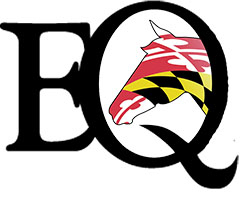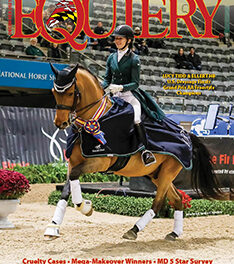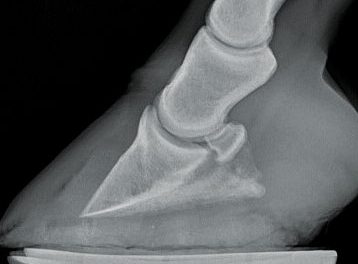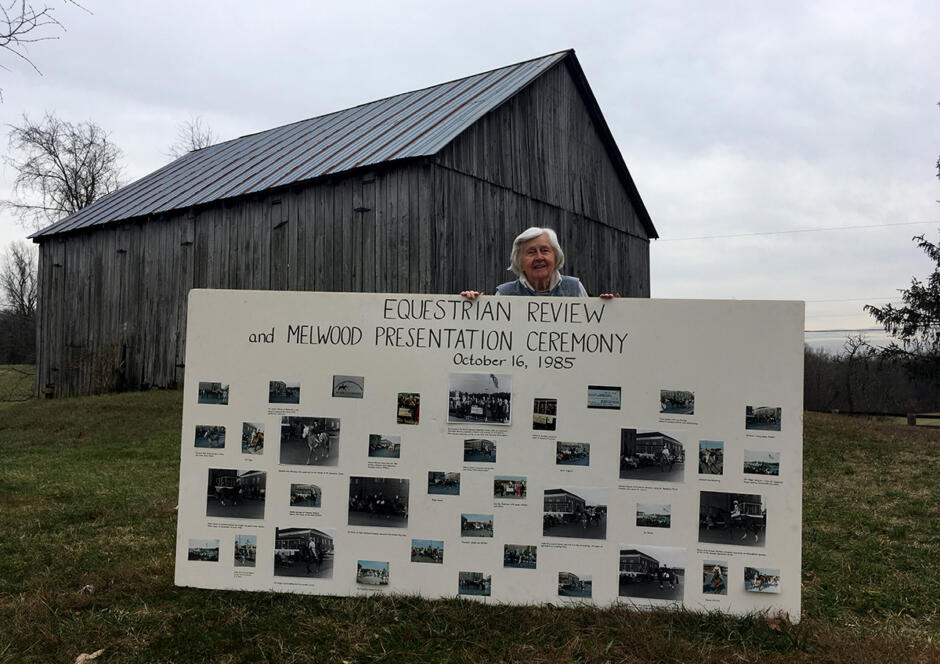
Ninty-seven-year-old Dorothy Troutman stands in front of one of the hay barns at her Glennwood Farm with photos from the 1985 Prince George’s Equestrian Review and Melwood Presentation Ceremony.
by Katherine O. Rizzo (first published in the February 2020 Equiery)
Imagine no Prince George’s Equestrian Center. Imagine no Rosaryville State Park. Imagine driving down Rt. 301 and seeing industrial complexes packed on both sides of the highway. It is sad to think about so much open space of rural Maryland being paved over, but thankfully there is Dorothy Troutman.
A small woman in stature with a powerful voice who singlehandedly drew communities together to preserve Upper Marlborough and keep it rural. Keep it green. Keep it for horses.
Welcome to Hollywood
Born on May 15, 1922, in Strawberry Point, IA, the young Dorothy Troutman was just as smart and quick witted as she is today at 97. After graduating high school as valedictorian, Dorothy went to secretarial school and then, with a family friend, headed west to California in search of a job in the early 1940s.
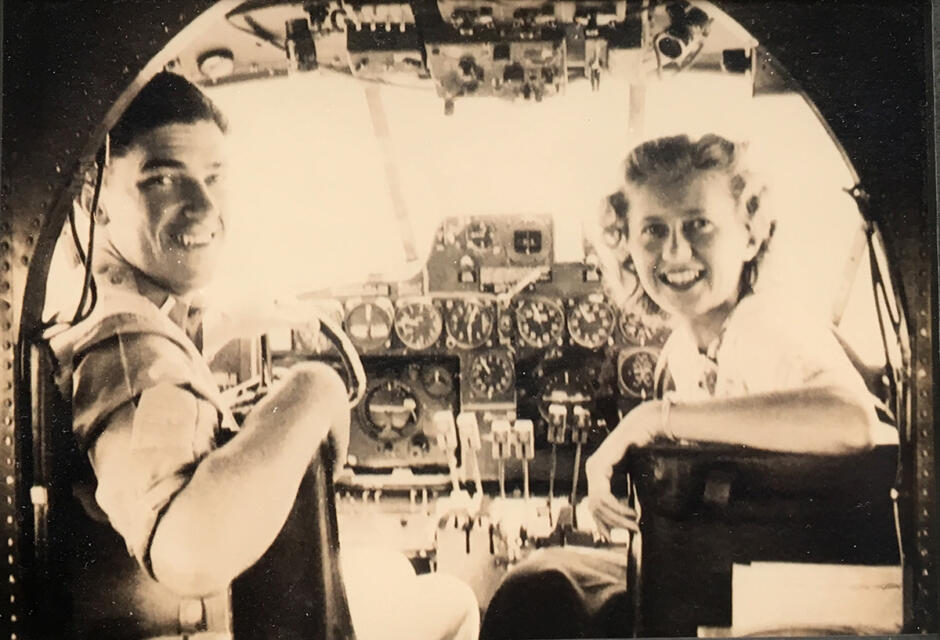
Dorothy met her husband George Troutman in Hollywood, CA, where she worked for Selznick International Pictures and he was an Army Air Corps bomber pilot. Both later became active lobbyists in Maryland.
At the height of World War II, Hollywood was the place to be according to Dorothy. “We lived in Sierra Madre while looking for work and then had an apartment right on Hollywood Boulevard,” she reminisced. “We had one of those efficiency apartments where the bed folded into the wall and a modest kitchen, but the location was fabulous!”
Dorothy landed a job at the famed Selznick International Pictures studios where she worked in the contracts department. “At a time of triplicates and carbon copies, the heads of the studio were impressed with how quick my mom was in dictation,” Dorothy’s son Glenn stated. “She told us that she never made mistakes and during the interview, finished the assignment so quickly she was hired right away.”
Selznick Pictures produced Academy Award winners Gone with the Wind and Rebecca. “I worked with the actors’ contracts and met some pretty famous people while there,” Dorothy remembered. She met more than just famous actors while in California, however.
While waiting for the streetcar one afternoon, a young Army Air Corps bomber pilot began chatting with her. “There were a lot of men from all branches of the armed forces that would ship in and out from there at the time,” she explained, adding with a smile, “I had so many dates in those days!” This particular young solider ended up being “the one” and in 1946 after the war had ended, she and George Troutman were married.
Glennwood Farm
The post WWII years for the young couple was full of typical Army travel as George was stationed at various locations around the country. His family was from Atlanta, GA, where the family law firm of Troutman Sanders LLP was headquartered. But as George started thinking of retirement, he moved into the lobbying field and worked primarily at the Pentagon where he was a lobbyist for the Air Force and later the aerospace industry.
With Andrews Air Force Base so close to the Pentagon, the Troutmans decided to settle in Maryland. “Our first place was a little ways from here,” Dorothy said while sitting at her kitchen table at Glennwood Farm in Upper Marlboro. “It was my daughters who really loved horses, so we started this farm for them.”
The Troutmans established Glennwood Farm in 1971, as a place to raise a family and have horses for their daughters Sandra and Diane. As their interest in horses grew, so did the farm and Dorothy’s involvement with the community. Glennwood Farm became a boarding facility; Sandra and her husband trained racehorses from there; and Dorothy’s grandchildren joined Marlborough Pony Club and the farm hosted many practices.
Preserving a Way of Life
Urban and industrial sprawl threatened the rural way of life in Upper Marlborough and Dorothy was quick to act. She coined the phrase “Keep Marlboro Country” and had bumper stickers made to hand out to community members and politicians. She began a campaign to change the county zoning laws in order to preserve open space and the traditions of farm life.

Dorothy, her daughter Sandra and Friends of the PGEC presented a check for $21,000 to John Rhonds, Chairman of the M-NC Park and Planning Commission in 1985.
“Dorothy is a truly remarkable individual,” said Jim Estepp, 9th District County Council member from 1995 to 2002. “When I first started to run for office, she was the person everyone said I needed to meet. She’s very influential in the community.”
Estepp said that preservation in general, not just for horse people, is very important to Dorothy. “She looked at the quality of growth within different projects and would support development as long as the quality was there.”
Dorothy explained that she did not oppose development as a whole, “it is the type of development that is important. We need larger housing parcels and not tons of buildings.” Estepp added, “she was able to get high end homes on larger pieces of land in a subdivision along Rt. 301 that also included horse trails. That’s how good she is at preservation.”
Estepp credits Dorothy with preserving the historic Croom area as well. “Croom lies along the path that the British took on their way to D.C. during the War of 1812,” Estepp explained. “While the tobacco farms in that area were being phased out, Dorothy was able to get many of them turned into equestrian farms instead of housing developments.”
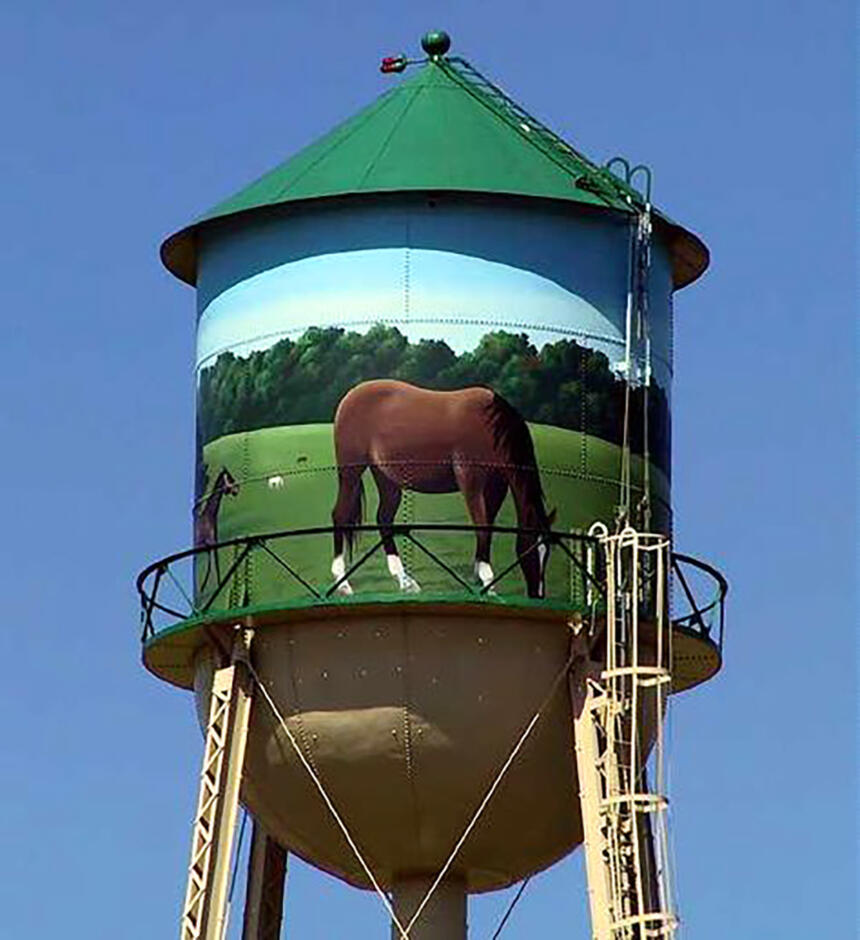
As a thank you to Dorothy, the water tower at the PGEC was painted with horses from her Glennwood Farm.
Prince George’s Equestrian Center
Before the Show Place Arena even existed, the location was used as a training facility for racehorses. “My husband and I would use the track to train on occasion and the county wanted to tear it up and put in a community center,” Sandra said. Dorothy did not oppose the community center; but she was able to get it moved so that a full equestrian competition and training center could be built on the grounds instead.
Estepp calls Dorothy, “the visionary behind the Prince George’s Equestrian Center” and many agree with his statement. “Dorothy made sure horses were still welcomed there,” said Rob Burk, CEO of US Eventing Association. Burk worked with Dorothy for eight years in his former position as Executive Director of the Maryland Horse Industry Board.
“It was my mom’s idea to get that all started,” Glenn said. “She basically did all the fundraising herself.” Glenn explained that Dorothy had been able to get the county leadership to agree to match whatever she was able to fundraise to build an equestrian center. “They really didn’t think she could do it but then she did and they had to give up the rest of the money!” Glenn added.
“Dorothy had a way of pulling people together and brought more and more people into the horse world through these projects,” Estepp stated. As a thank you for her efforts, Estepp had the water tower at PGEC painted with horses from Glennwood Farm.
“Every time I pass the water tower on Route 301 with the mural of horses painted on it, I think of her,” Prince George’s county horsewoman and former Maryland Horse Council Secretary Valerie Ormond said. “I know she was instrumental in making the Prince George’s Equestrian Center become a reality. It goes to show how one person with a vision, dedication and an uncanny ability to make things happen, can make a difference in the lives of people for many years to come.” Ormond sat on the Prince George’s County Equine Industry Task Force with Dorothy in 2010 and 2011. The creation of this task force was another one of Dorothy’s ideas.
Rosaryville State Park
Another one of Dorothy’s biggest legacies is Rosaryville State Park, home of the Mount Airy Mansion. According to the Maryland Department of Natural Resources, “The Mount Airy Mansion is one of the oldest Maryland mansions connected to the Calvert family, the Lords Proprietor of colonial Maryland.” It was a hunting lodge for the Lords Baltimore and dates back to the 1600s.
“The state was going to shut it down, but Dorothy formed the [Rosaryville] Conservancy to run the property,” Estepp explained. “We were very worried we were going to lose that park,” Dorothy said, and so she organized the horse community to save it.
Dorothy’s idea was to use the park for a variety of horse activities such as horse trials, hunter paces, fox hunting and trail riding. She brought different people from each discipline together to form the Conservancy, which supplied both funding and volunteers to keep the park open and maintained.
The first Marlborough Horse Trials was held in 1992 and in a moment of weakness, friend Pam Link agreed to organize it. “I used to event but had moved over to dressage and just couldn’t say no to Dorothy!” Pam said. Pam added that the Marlborough Hunt Club was also very involved in those early years of the horse trials.
“This was a way to get people organized to keep the place looking good,” Dorothy said. And it became a family affair! Volunteers from all over the area came to clear trails and mow fields. “It was a lot of work for sure but you feel good doing it,” Pam explained.
Dorothy never does anything in half measures and she attacked this new horse trial with the same passion as every project she works on. She went right to the top of the course design world meeting with Los Angeles Olympic course designer Roger Haller to ask him to be their course designer.
Top jump builder Chris Milanesi was brought in as well. “His jumps were just perfectly built,” Glenn remarked. “Some of them are still there and you can tell which ones Chris built versus the new builders.”
“I remember driving into that park the morning of that first event and being worried no one would be there,” Pam said laughing. “We had full entries with a wait list but I was still shocked when I saw all the trailers all lined up.”
The Marlborough Horse Trials have had a few organizers over the years and is still one of the few non-profit run events in the state.
One Common Voice
Even though Dorothy had a full plate just in Prince George’s County, she expanded her conservation efforts through the Maryland Horse Council and Maryland Horse Industry Board. “Dorothy was involved in every aspect of the horse industry,” said MHIB Executive Director Ross Peddicord. “She was one of our founding board members and sat on the board for nearly 20 years.”
Peddicord said that Dorothy stepped down just a few years ago when she was 94. “Her term was up for re-election but she remarked how she’d be 98 by the time the next term ended.” Peddicord added that Dorothy never missed a meeting saying, “her input was always valued.” Peddicord also commented on Dorothy’s political skills saying, “she is very politically savvy and known as a community activist.”
Crystal Brumme Pickett of the Maryland Horse Council agrees with Peddicord stating, “she quickly became a mentor to me, teaching me how to navigate the halls of Annapolis, how to build relationships with our elected leaders and their staff.” She added, “Dorothy perfected the art of grassroots lobbying, always keeping in mind the greater community good yet remembering that political favors should be used wisely and not squandered.”

In 2014, Dorothy received the Outstanding Civic Achievement Award from the Greater Prince George’s Business Roundtable. Pictured with her are Maryland Attorney General Brian Frosch (red tie on left) and Jim Estepp (blue tie on left), among other members of the roundtable.
Estepp also noted that Dorothy’s kind and quiet way of interacting with politicians is what makes her so successful. He said, “You could disagree with her but still be friends. She used kindness to get things done, and it worked!”
“Dorothy is an amazing vault of information and knew all the major players in Maryland government,” said Burk. “She is absolutely ageless and has connected so many of us in the sport. She made sure local politicians knew the history and heritage of horses in Southern Maryland.”
Dorothy was also a founding member of MHC and received the organization’s Pumphrey Memorial Award in 1998. “At the time there were so many people with horses around the state but no one was organized outside of their specific discipline or breed,” Sandra explained. “Mom knew that the industry as a whole needed a voice.”
Once again, Dorothy and a group of core activists came together and MHC was formed in 1985. “That is what my mom does, she brings everyone together,” Sandra added.
For bringing everyone together with one common bond and one common voice, we thank you Dorothy Troutman!

